Observing the Census
International observers of 2022 Census share experiences on data collection in six cities
September 29, 2022 02h00 PM | Last Updated: September 30, 2022 12h24 PM
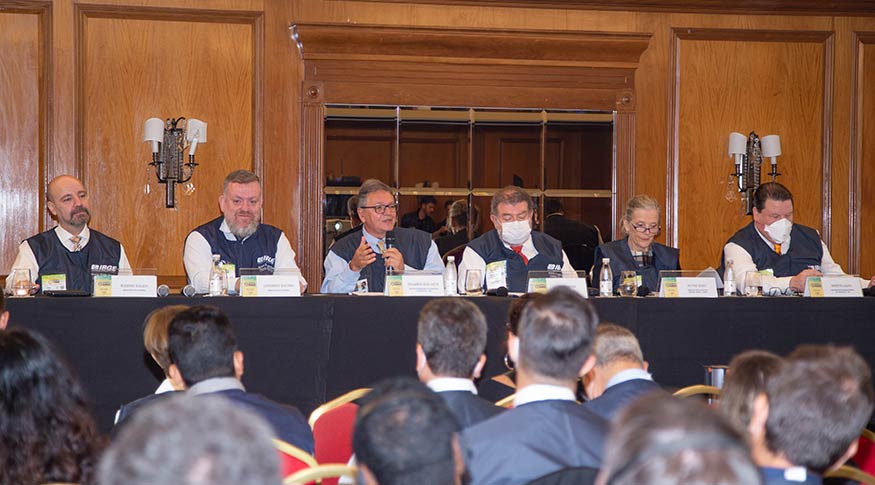
Attended by observers from statistical agencies of 18 countries in North, Central and South America and Africa, besides representatives from international organizations, in a total audience of about 160 persons, the closing meeting of the Project Observing the 2022 Census was held in Rio de Janeiro last Monday (26).
The foreign observers, who came to Brazil and were into the participating in the census, from September 19 to 23, in Belo Horizonte (MG), Cabo Frio (RJ), Florianópolis (SC), Recife (PE), Boa Vista and Pacaraima (RR), reported the experiences they shared in a week of activity and how the lessons learned may be used in the future, both in Brazil and in their countries of origin.
The result of a partnership between the IBGE and the United Nations Population Fund (UNFPA), the international Labor Organization (ILO) and the Brazilian Agency for Cooperation (ABC), of the Ministry of Foreign Affairs, Observing the Census started with two virtual phases. In this case, countries’ representatives had the opportunity to attend lectures about the different aspects of Brazil’s Population Census operation.
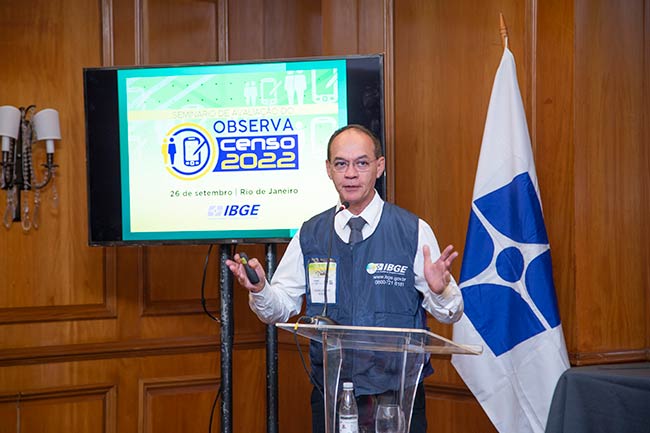

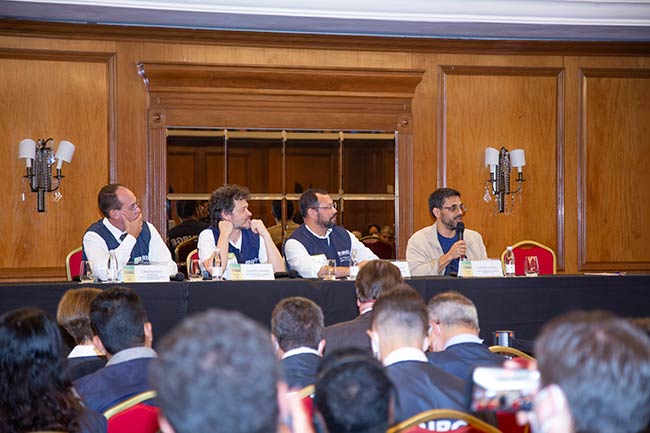
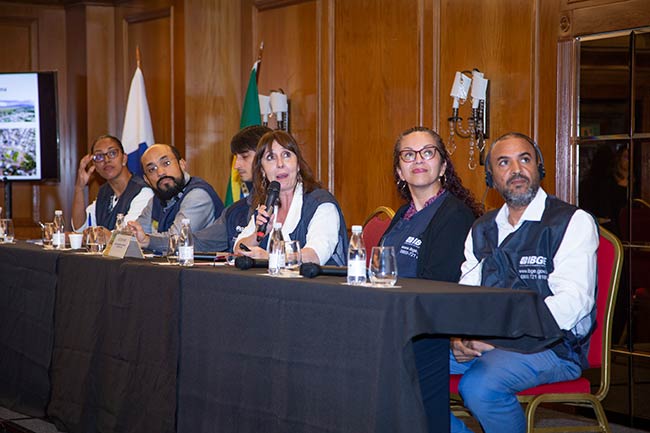
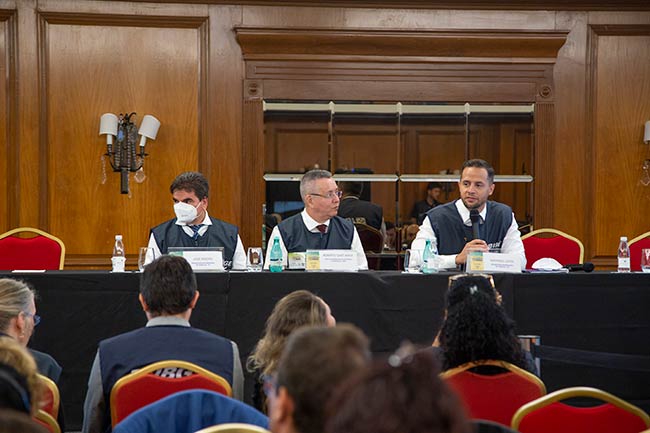
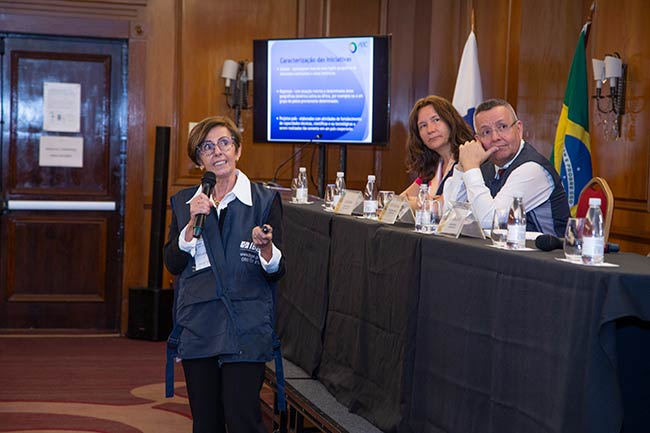
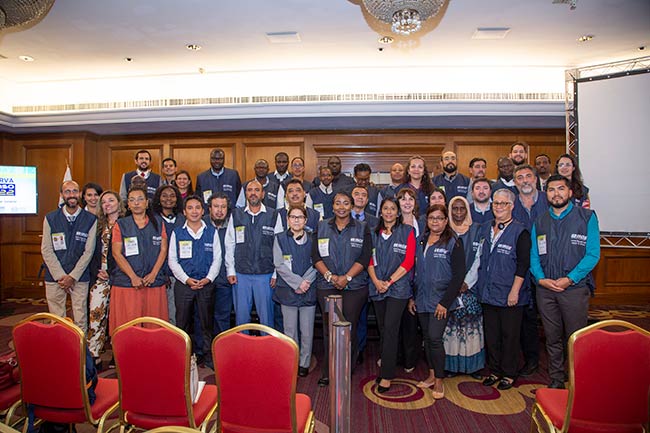
As he opened the meeting, the president of the IBGE, Eduardo Rios Neto, thanked the organizations that helped the Institute in the Observing the Census Project. He spoke about the main innovations in the survey and called attention to the IBGE’s initiative of inviting observers to watch data collection for the 2022 Census.
“The details and logistics in this event were not only the result of our work at the IBGE, but also a contribution of our tireless partners from ABC, UNFPA and ILO, to whom I express my gratitude. In ours first rehearsal in Paquetá, last August, I was asked about what the main innovation would be this year. I mentioned real-time Census monitoring, which would allow immediate data transfer and better management feedback. And this is one of the things that stood out, according to the observers, data transfer from the field,” said the president.
Observers praise IBGE for the Census and plan on using innovations in their own surveys
The closing event was marked by presentations delivered by representatives of the groups visiting Belo Horizonte (Angola, Cape Verde, Guinea-Bissau, Mozambique and Saint Tjomas and Prince), Cabo Frio (Bahamas, Belize, Senegal, Sudan and Trinidad and Tobago), Florianópolis (Chile, Peru and Uruguay), Recife (Colombia, Ecuador, Mexico, Dominican Republic and Honduras) and Boa Vista and Pacaraima (representatives of international agencies).
Ana Angelina Fontes Gomes, from the National Statistics Institute of Cape Verde, who was in Belo Horizonte (MG), saw as positive this visit to Brazil. “It was a great pleasure to be part of this huge Project Observing the 2022 Census. Two essential aspects stand out from this week spent in Belo Horizonte. Census Planning as a whole, which was very well conceived in its entirety, including recruitment, selection, training, cartographic bases and management tools. Also important were its successful execution and the fact that Brazil, and the IBGE, respect international rules for such a big operation.”
Ms. Gomes added, “As for the improvement of methodologies to identify ethnic minorities, we acknowledge a very important step has been taken to identify the quilombola population and we were impressed to hear how that was done. Since that is a new methodology, we recommend that it be improved so that all the population in these minorities will be identified.”
When mentioning the main lessons learned during this week of observation, the expert recalled that the technology used in the Census should be implemented in other countries. “We have also listed some important aspects to include in our own census operation. The harmonization of address lists, capturing of coordinates at the moment if the interview and the interconnection between different applications were relevant points, since the digital Census is not yet a reality in many countries, “ she concluded.
Mohamed Melanine, representative of UNFPA Sudan and a member of the group visiting Cabo Frio (RJ), celebrated having the opportunity of visiting enumeration areas with different realities and praised the Institute on the entire training program of enumerators and supervisors. “We were very pleased because the IBGE team introduced us to enumeration areas of different kinds, in richer, middle-class and poorer areas, and even in rural locations. That allowed us to have a wide variety of experiences.
We also visited supervision areas and a data collection facility,” says Mr. Melanine. “We noticed supervisors and enumerators are very well trained in the methodology and use of Census equipment. In the areas we visited, there was a very small number of refusals to answer the questionnaire. In four enumerations areas visited, only four refusals were recorded.”
He also spoke about the main factor observed during monitoring and that may be applied to data collection in his own country. “Many can think that in a digital operation the use of paper maps is not necessary. In Sudan, particularly, we have 63 thousand enumerators. Printing so many copies costs a lot and were hesitant to do it or not. Considering the experience in Brazil, we now know that it is important to give the enumerators a paper map, for a number of reasons. It helps them have a wider view of the area covered and also save battery of the mobile device. That is good practice we will use in our operation,” Mr. Melanine added.
IBGE celebrates the sharing of experiences and will use that knowledge in other cooperation projects
The IBGE’s Director of Surveys, Cimar Azeredo, took the opportunity to thank for the help received throughout Observing the 2022 Census and mentioned the IBGE’s objectives and expectations when planning the meeting. “We are immensely grateful for the support of agencies such as the UNFPA, ILO, ABC, ACNUR and OIM to conduct an event like this. We hope to have been able to show the observers all the advances made in this Census in comparison with the 2010 edition, mainly in the technological field, and also the series of challenges we still have and how we are working to overcome them.”
Cimar also explained how such a project can help the IBGE establish more partnerships in the future: “The idea of creating this event was also related to the intention of having in IBGE’s superintendency offices conduct this cooperation process. We are often invited by other countries to speak about the Census but many times it is not possible to help all of them. Now, with this Project, we have more professionals prepared and experienced enough to spread our knowledge.”
Roberto Sant’Anna, manager of International Affairs at the IBGE, made an analysis of Observing the Census and mentioned the experiences shared throughout this period. “The Project proved to be a very successful activity, since it could give the participating institutions an opportunity to share experiences and learn from practice. For the IBGE, it was important because, once more, we had the change of participating and showing the excellence of this Institute and, besides that, to get to know and receive information and experiences from international institutions.”




















